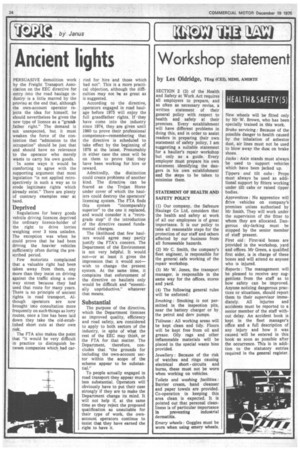Workshop statement
Page 26

If you've noticed an error in this article please click here to report it so we can fix it.
by Les Oldridge, TEng (CEI), MIMI. AMIRTE
SECTION 2 (3) of the Health and Safety at Work Act requires all employers to prepare, and as often as necessary revise, a written statement of their general policy with respect to health and safety at their premises. Every establishment will have different problems in doing this, and in order to assist readers in preparing their own statement of safety policy, I am suggesting a suitable statement for a haulier's repair workshop but only as a guide. Every employer must prepare his own statement identifying the dangers in his own establishment and the steps to be taken to minimise them.
STATEMENT OF HEALTH AND SAFETY POLICY (1) Our company, the Safesure Haulage Co Ltd, considers that the health and safety at work of all our employees is of great importance. It is our policy to take all reasonable steps for the protection of our staff and others affected by our business from all foreseeable hazards.
(2) Mr C. Smith, the company's fleet engineer, is responsible for the general safe working of the repair workshop.
(3) Mr W. Jones, the transport manager, is responsible in the same way for the offices, stores and yard.
(4) The following general rules will be enforced: Smoking : Smoking is not permitted in the inspection pits, near the battery charger or by the petrol and dery pumps.
Tidiness : All working areas will be kept clean and tidy. Floors will be kept free from oil and grease. Oily rags and other inflammable materials will be placed in the special waste bins provided.
Jewellery : Because of the risk of watches and rings causing electrical short oircuits and burns, these must not be worn when working on vehicles.
Toilets and washing facilities : , Barrier cream, hand cleanser and paper towels are provided. Co-operation in keeping this area clean is expected. It is pointed out that personal cleanliness is of particular importance
In preventing industrial dermatitis.
Emery wheels : Goggles must be worn when using emery wheels. New wheels will be fitted only. by Mr W. Brown, who has been specialty trained in this work. Brake servicing : Because of the possible danger to health caused by the inhalation of asbestos dust, air lines must not be used to blow away the dust on brake shoes.
Jacks: Axle stands must always be used to support vehicles which have been jacked up. Tippers and tilt cabs : Props must always be used as additional support by fitters working under tilt cabs or raised tipper bodies.
Apprentices: No apprentice will drive vehicles on company's premises unless authorised by Mr Smith. They will work under the supervision of the fitter to whom they are allocated. Dangerous sky-larking must be stopped by the senior member of staff present.
First aid: First-aid boxes are provided in the workshop, yard and offices. Mr Green, a qualified first eider, is in charge of these boxes and will attend to anyone who is injured.
' Reports : The management will be pleased to receive any suggestions from the staff as to how safety can be improved. Anyone noticing dangerous practices or situations, should report them to their supervisor immediately. All injuries and accidents must be reported to a senior member of the staff without delay. An accident book is kept in the fleet manager's office and a full description of any injury and how it was caused will be entered in this. book as soon as possible after the occurrence. This is in addition to the statutory entries required in the general register.












































































